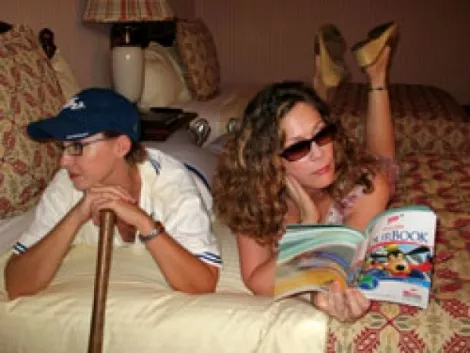
In many ways, though, the stage is a less forgiving place than television. Where a film can hide deficits of performance with editing and camera work, half-baked performances in live theater become apparent when every reaction is visible and every pause is filled by people occupying space, regardless of whether or not they are the intended focus of a particular moment. Though some of the performers are exceptional, ultimately saving the play on balance, it is in these quiet moments that some members of the cast of Batting Cage fall short.
That’s where Brandie Balken comes in. She plays Wilson Finley, the surviving twin of the deceased. She opens the show, entering the specifically generic lower-midrange hotel room in which the entirety of the show’s action takes place, sighing and tramping around the stage with self-conscious effort. She flops onto one of the double beds and assumes the first of many carefully crafted horizontal poses of malaise and ennui which will characterize her throughout the first act. Her performance is overmannered and overblown. Her shrugs, eye-rolls and bed flops seem more like the stuff of a pouting teenager than a grieving chemical engineer.
These shortcomings are most pronounced in her biggest scene, from which The Batting Cage takes its name. Wilson, mostly and pointedly silent throughout the first act, wakes her sister, Juliana (Christy Summerhays) with a passionate and long-winded chronicle of her afternoon trip to the local batting cages. The details aren’t important here. What matters is that—especially as the eponymous scene, home to the grand central metaphor of the show—a certain subtlety is called for which Balken fails to deliver. Instead, she hammers away at it to a cringeworthy degree. Some of the weakness may be with the script at this point, but Balken doesn’t do it any favors.
All that being said, The Batting Cage is rescued by the singlehanded effort of Summerhays. As Juliana Finley—a name she’s recently using again after 20 years of marital neglect—she handles a near-continuous 40-minute stream of nervous chatter against Wilson’s stubborn silence with remarkable skill. The family history, her personal troubles and neuroses, and even a little South Florida history flow out of her directed monologue with a compelling, delicate and naturalistic ease. Watching her lie on a bed with a nap-induced sunburn makes one’s eyes water in empathic pain. She is a joy to watch.
The only downside of Summerhays’ stellar performance is that when her character’s energy ebbs in the second act, so does the entire show. While she spends consecutive scenes representing days recovering from the aforementioned burn, everything plods on around her, waiting for her to perk up. She does exactly that in the final scene, which goes a long way toward redeeming the previous half hour, but audience members can’t help but feel like they’ve been kept in a holding pattern, just waiting for the big finale.
Also worthy of note are the set and lighting design by Brad Henrie and Pilar I, respectively. From the bad painting above the just-cheap-enough bedstand to the variations of sunset intensity out the sliding-glass balcony doors, they work together to bring the audience very firmly into the world of not just a hotel room on a beach, but to a very particular hotel on a certain beach far away from here. It’s a specific place for two sisters to come to terms with the absence of the third, just like the third would have wanted. If only these two actresses could reconcile their performances, the audience could feel the same satisfaction.
THE BATTING CAGE, Pygmalion Productions @ Rose Wagner Performing Arts Center, 138 W. 300 South, Through Oct. 20, 355-2787, PygmalionProductions.org